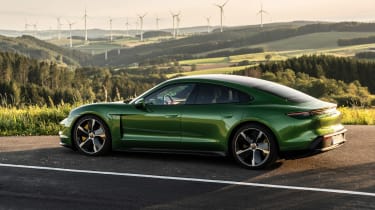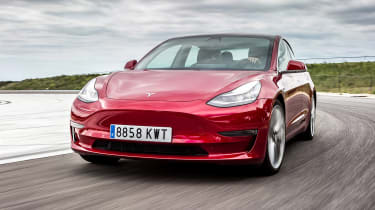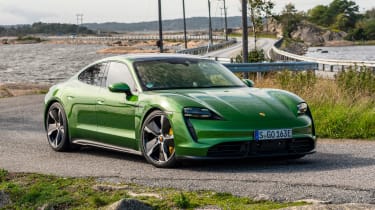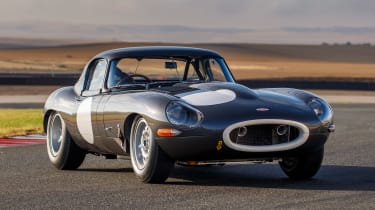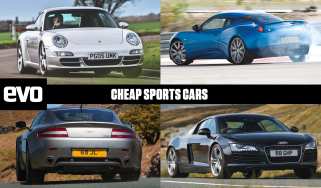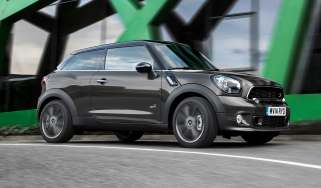Electric performance cars: will an EV ever really deliver?
The electric performance car is here to stay, so we weigh up the pros and cons of what might evo cars of the future
Can a real evo car really ever be powered by electricity? It's an argument that's been ranging between enthusiasts from all parts of the automotive world, but whichever side of the argument you find yourself on, the industry has had no choice but to cautiously go ahead develop them anyway. So we posed the question to the team, with staff writer Antony Ingram backing the notion and evo co-founder John Barker rebutting with an argument against.
Here are their cases; you can decide which you agree with more...
The pros
By Antony Ingram
Let’s start with some ground rules, as there are some inarguable points that, while not necessarily relevant to evoness, are relevant to electric vehicles as a whole.
Electric cars are inherently more efficient than the alternatives – better at turning energy into motion. They’re also cleaner, as a rule. There are fringe scenarios where they aren’t: if all your electricity comes from coal power, say. But generally speaking, while EVs require more energy to build, that initial hit is quickly compensated for in use – providing you have somewhere to charge them.
Yes, there are some fundamental tropes of driving enjoyment that aren’t best served by electric cars. The primal satisfaction of the noise emitted by a great engine, or the sense of mechanical interaction with the best manual transmissions, may never be replicated in an EV. However, if there’s doom and gloom about the future of driving, electric power isn’t its cause, and may even be its saviour.
> New Porsche Taycan review - Stuttgart puts its stamp on the electric car era
‘Maximum torque from zero’ has become an industry meme, but it’s no less relevant now than it was for the very first production EVs. No combustion-engined car can leave the line as smartly and efficiently as one with electric power. The way a Tesla launches from a standstill will churn your stomach, but its real party trick is the way it responds with perfect linearity and imperceptible delay to movements of your right foot. It’s like having the throttle response of an Audi R8 V10 at 6000rpm in second gear at your constant beck and call, irrespective of road speed.
To assume it’s all about straight lines is to do such response a disservice too – think instead of the accuracy to which you could adjust a car’s line mid-corner or over-rotate its rear tyres on the way out. Electrification means the end of being in the wrong gear for a corner (or worse, the car selecting one of umpteen wrong gears itself), and of wobbly torque curves. That’s without the potential offered by torque-vectoring set-ups too, something electric motors can do with greater fidelity and intensity than any conglomeration of differentials and clutch packs.
When evo has driven performance hybrids in the past, the combustion engine often feels like the weak link. Yet it’s rare we climb out and find ourselves wishing for a better engine – we’re wondering what such cars would be like powered solely by batteries.
The benefits of electric power haven’t escaped the aftermarket either. Converted classics are becoming more frequent, and the advantages of such machines are obvious. Lower maintenance requirements, better reliability and more performance, and they are cars unlikely to be used for daily duties, so range and recharging aren’t as deal-breaking as they might be in a primary car.
> Jaguar E-type Zero review - is this electric E-type be the future of classic cars?
What you lose comes down more or less to aural appeal, but having driven Jaguar Classic’s converted E-type and a classic Beetle with electric power, I can’t say I particularly missed the former’s in-line six or the latter’s rattly and anaemic flat-four.
Had technology stopped at some arbitrary point in the past we’d have been denied some amazing cars. We’d be denied some amazing EVs if we collectively decided now that internal combustion was all that mattered for the thrill of driving.
The cons
By John Barker
Driving is a lot duller with an electric car, a dumbing down, like going for an auto rather than a manual, only more so because electric cars take away gearshifting and also set the engine to mute or, worse, whine.
‘But electric cars are really quick: a Tesla will out-drag almost any supercar.’ Yes, yes it will. The take-off in an electric car can be dizzying, yet easy – just pin the throttle. The fastest electric car is now sub two seconds. But that’s as relevant to regular driving as a car’s maximum speed is. When was the last time you did a standing start?
‘General throttle response is incredible, too.’ Also true, and that’s great if you’re the driver. If you’re a passenger, it’s a literal pain in the neck. In a conventional performance car passengers get some warning before the acceleration comes – the downshift, the rise in engine revs, etc. In an electric car only the driver knows when to brace. Everyone else finds their head slammed against the headrest. After 20 minutes in the passenger seat of a very quick electric car I had a mild headache while its driver marvelled – repeatedly – at its throttle response, not knowing he was getting ever closer to being throttled (pun intended).
‘They’re dynamically impressive, though.’ Yes, for a heavy car. All the mass – the battery pack – is down low and central and the more potent ones drive both axles so they’re four-wheel drive. But where’s the interest? No one is going to put most of the weight in the back to make a 911-style car, or in the front for a hot hatch. Yes, they potentially have individual wheel-drive, to influence the dynamics on and off the throttle, but it’s still going to be a heavy car. And no matter how good their theoretical range, if you drive them hard, the distance to fully discharged plummets like the range of a conventional car with a hole in the fuel tank. Take them on a track and you’re lucky to get more than a single flat-out lap. Also, drive them where the roads are interesting and there are no fast-charge points.
And don’t get me started on electric classic cars. They’re the equivalent of a grandfather clock with a quartz movement. An E-type without an XK straight-six has no heart. Another firm has just launched an electric-powered original Mini, with prices ‘from £79,000’. What is the point? What makes an original Mini great is that it’s small and light and all snorty carbs and agility. An electric version offers all the discomfort with none of the benefits, like alcohol-free beer. Besides, most of us have already experienced what an electric classic would be like because we’ve been on the end of a tow rope.
City-dwelling rule-makers are pushing for electric, and that’s fair enough. Cities should be low-emission zones. But let’s not kid ourselves: autonomous is where electric power, lane keep assist, smart cruise control and all those other ‘driver aids’ are taking us, and that makes sense in and around cities, to make the traffic flow better. But before governments come for our combustion-engined cars they should tackle the major polluters – the supertankers and cruise ships burning sludge, the aeroplanes and the coal-fired power stations. Non-city dwellers need the flexibility combustion-engined cars offer. And we enthusiasts? We just love them.

